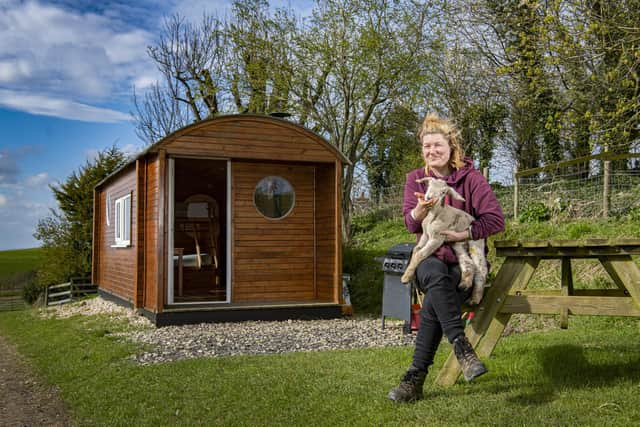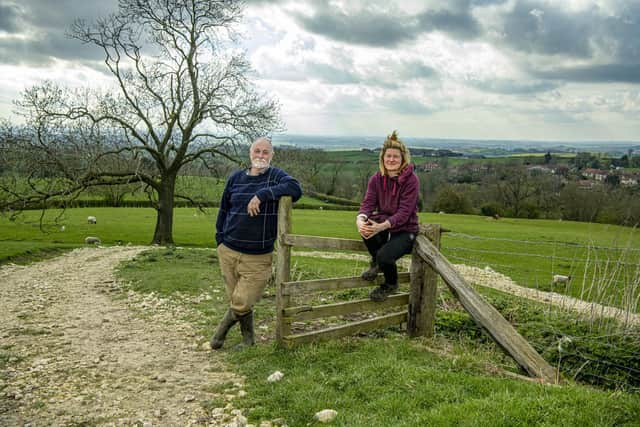Farm of the Week: From teaching in China to returning home to run lambing experiences and help widowed father
Alice Arnott came back home to the 100-acre Manor Farm at Acklam five years ago to take over from her father Chris who purchased the farm in 1985 having been a pig farmer at Fimber.
Alice said her first lambing on returning to the farm full-time, having taught English in China and having worked in education in Canada, Bristol and Scarborough, immediately tested her resolve over whether she was up to the task. Her dad having announced he had been thinking of selling up.
Advertisement
Hide AdAdvertisement
Hide Ad“It was now or never if I wanted to have a go at farming. I’d been taking a bit of annual leave to help out on a mate’s farm at lambing time as I’d grown up on the farm and I had liked it. I’d spoken to my cousin from East Yorkshire who is from a farming background and he gave me a push.


“I returned fully in February 2017 after having come back initially at Easter 2016. The weather was just awful, muddy, wet and cold. At that moment I felt like ‘what have you done, Alice? You’ve left all your friends having a good time in Bristol’, but it’s good. I honestly haven’t looked back, but it has also been hard.
“Dad has pushed me a bit. I’ve always had the vision, but dad has given me the drive and he’s now taken a step back.”
Chris said he laid everything on the line to Alice before she made her decision.


Advertisement
Hide AdAdvertisement
Hide Ad“My wife Sara passed away in 2015. I’d had cattle and sheep on the farm since coming here. I’d had roughly the same number of breeding ewes as we have now and a herd of 25 beef suckler cows, but I had sold the cattle before Sara passed away. I’d been thinking of selling the farm but friends had advised not to do anything too quickly, to leave it a little while and let things settle. In that time, before I had time to sell it, Alice was at home and had said she wanted to farm here.
“I told her all the problems that come with being a farmer on what is a small family farm and to think about it seriously for a couple of weeks.”
Alice said her version of events is slightly different. “Dad couldn’t wait to have me back. He loved the idea. My plan was to combine sheep farming with tourism, which is what we do today, hence the lambing experience days as well as some glamping pods and wild camping.”
This year’s lambing is nearly at its end having started just before the due date of March 23 and Alice has welcomed over 100 visitors to the farm while lambing has been taking place.
Advertisement
Hide AdAdvertisement
Hide Ad“This year we had our 126 breeding ewes, made up of a mix of Texel, Texel-crosses, Border Leicesters, Suffolk-crosses and Berrichon-crosses we’ve bred ourselves and Mules we’ve brought in, that we have put to our team of four tups.
“We used a Charollais tup we bought through Malton livestock market, from Deborah Whitcher’s Galtres flock in Skewsby; a Texel and two Texel-cross-Charollais ram lambs.
“I particularly like the Charollais-cross lambs born out of the Mules and Border Leicesters because they have lots of vigour at birth and it will be the females of those that we will keep as replacement mothers.
“We will have around 200 lambs giving us a prolificacy of around 175 per cent with all of the ewes brought in the sheds for lambing and then turned out as soon as they are ready, usually in around 24 hours of lambing.
Advertisement
Hide AdAdvertisement
Hide Ad“I have two great local men, Finn Varney and Richard Hall, both from Ryedale who help on the farm. I pretty much do everything else with help from my dad and a couple of mates. We keep around 25-30 ewe lambs as replacements with the majority of our lambs going through Malton livestock market for meat.
“I’ve just finished my lambing experiences which are all one-hour sessions which involve a good deal of that time in the lambing shed where visitors can pet and bottle feed the lambs and might also experience the real deal of an actual birth.”
Alice said she is keen to give people who have never seen lambs or lambing close up the opportunity.
“I talk with them about lambing, what is involved and why sheep farming exists. I like to keep the groups small with a maximum of 12 and I only run the sessions at the height of lambing when the greater numbers of our lambs are anticipated being born. This year I’ve run nine sessions, usually one or two per day.
Advertisement
Hide AdAdvertisement
Hide Ad“Watching people’s faces in awe at the new-born lambs or when a lamb is born is so satisfying.”
Chris said the lambs that are destined for meat are taken through to 40 kilos and that they feed on hay and rolled barley as well as the sheep living off the grass.
“We have always needed to let them go, so that the grass is back in condition for the ewes. I used to grow silage when we had cattle but now Alice concentrates on hay as it is easier to feed the sheep.”
Alice said her plan of combining sheep farming with tourism has brought about additional income to the farm as she’d hoped.
Advertisement
Hide AdAdvertisement
Hide Ad“There are amazing views from Greets Hill when the weather is spot on. That’s where the wild camping takes place. We have three glamping pods. One is a shepherd’s hut that we put in place in 2018, another is a land pod that is made of timber and has a canvas side that opens up like a safari tent and we also have a fibreglass pod that we started with in 2021.”
Alice said Greets Hill and Manor Farm is fast becoming a popular destination. “People love the lambing experiences, our Acklam Farm Stays as we call them, and on June 18 we are going to host our first Acklam Sports and Gymkhana on Greets Hill with all kinds of races.”
Chris added: “I now devote more time to hobbies and friends, including fishing and canoeing, but I’m here if Alice needs any advice.”
